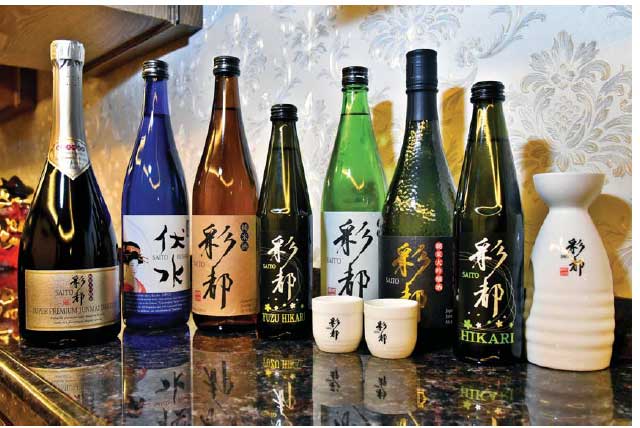 To appeal to non-Japanese speakers, Chow and Her have included information in English on the labels, wine-style. It informs drinkers where the sake is made, what temperature it should be drunk at and what it pairs well with. They have further departed from Japanese tradition by using a Burgundy-style bottle for their Super Premium sake, which is known for its light and floral taste. The Saito Super Premium uses yamada nishiki, a short-grain rice favoured by sake brewers for its ability to absorb water and dissolve easily.
To appeal to non-Japanese speakers, Chow and Her have included information in English on the labels, wine-style. It informs drinkers where the sake is made, what temperature it should be drunk at and what it pairs well with. They have further departed from Japanese tradition by using a Burgundy-style bottle for their Super Premium sake, which is known for its light and floral taste. The Saito Super Premium uses yamada nishiki, a short-grain rice favoured by sake brewers for its ability to absorb water and dissolve easily.
Chow did not envision a long career in the drinks industry when he started out in 1993. Born in Johor, he moved with his family to Singapore and attended Hwa Chong Junior College. After completing National Service, he signed on as a constable in the police force as he wanted financial independence. “The pay was $770, a princely sum in 1983,” he recalls with a laugh. After two years, Chow went on to pursue a business degree at the National University of Singapore. He then returned to serve out the remainder of a five-year bond and was assigned to the Investigations Unit. “That was very tough as we had to do 24-hour shifts; everything from petty crime like shoplifting to organised crime,” he recalls. However, his stint in law enforcement turned out to be useful in the business world. “I could use all the interpersonal skills I had acquired in the police force — how to conduct interviews, how to pacify, how to empathise with people,” he says. When he was headhunted to join Riche Monde in the early 1990s, he noticed there were hardly any graduates in the industry. “It was all cowboys,” he says. Chow entered the world of sales and marketing, managing brands like Hennessy cognac, Moët & Chandon and Gordon’s Gin. After seven years, wanting a different challenge, he switched to tobacco, joining Reemtsma International Far East, a German tobacco company whose brands included Davidoff and West. “It was very challenging to launch a cigarette brand like Davidoff in Singapore and Malaysia as it was the most expensive cigarette at the time,” he recalls. In addition, restrictions on advertising were tightened and West had to terminate its sponsorship of the McLaren Formula One team. After three years, during which the company was absorbed by Imperial Tobacco, Chow left. “I had a crisis of conscience,” he says. His son was in primary school then and starting to realise what his dad did for a living. Aside from his son, now 21, Chow has two daughters, aged 19 and 14. He returned to the world of alcoholic beverages with Maxxium WW, a four-way venture between Remy Cointreau, Absolut, Jim Beam and Macallan (owned by Edrington Group).
Ironically, Suntory went on to buy Beam in 2014. That was a wake-up call for Chow as he reckoned the new owners would want to put their own people in key spots and would have a Japanese way of doing business. He decided to strike out on his own. “I had learnt enough,” he says. “It was time to do things for myself.” When Chow left Beam, he was managing director, overseeing 11 businesses across Southeast Asia and Greater China. “It was a very big job for an Asian,” he says. Chow decided to go into business with Her, whom he had met in 2009 when Beam was looking for a distributor in Malaysia. “I was very impressed with Asiaeuro’s training regime. It was much more thorough than at any other spirits company,” he says. When marketing spirits, salespeople would typically push brands to clients by emphasising the margins they stood to make, he explains. But with Asiaeuro, every salesperson was schooled in the products they sold, such as the vintage and provenance of a wine. “All their salespeople have tasted Chateau Lafite because Her wants them to know what a $2000 bottle tastes like [as opposed to] what a $20 bottle tastes like,” Chow says. He set up the Singapore branch of Asiaeuro in early 2016. The group, which is headquartered in Kuala Lumpur, also has a strong presence in China and Hong Kong. Chow likes dealing with artisanal spiritmakers as they are open to customising products for customers like him. For example, Asiaeuro is working with Tamdhu to produce whisky targeted at the China market using a unique sherry cask. Together, they are also making a single malt with lower alcohol content that has more smoothness from special treatment in the cask, specifically for the Singapore market. “In the drinks business, you can’t lose the human touch, which is what happens when you become a big player,” Chow reckons. As an emerging entrepreneur in the spirits and food business, Chow is banking on doing just that. Sunita Sue Leng was formerly an associate editor with The Edge Singapore This article appeared in Issue 797 (Sept 18) of The Edge Singapore.









